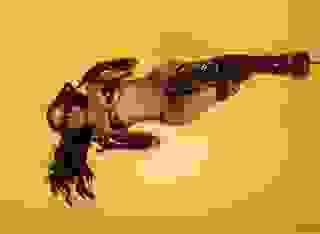- How To
- Then vs Than
- Comments
All Comments on 'Then vs Than'
by Angel Love
- 19 Comments
Blessings on you, Angel Love. Please don't stop doing what elementary schools should have been doing. Now please go on to cover there/their/they're, lay/laid/laid vs lie/lay/lain, and the second-grade to/too/two.
Even good erotica is spoiled by illiteracy.
Thanks for the article. My pet peeve for grammatical errors is to, too and two.
Boyd
It would seem that "your" not done, until "you're" fans have convinced you to correct each and every little speed bump to the flow of reading.
Nicely done.
Never had a problem with “then” or “than”, they’re like chalk and cheese and like my fellow Englishman, below, I should asked the same question, is it an American thing?
Many combinations should and could be “how to ’s” for example “lie” and “lay”, “there” and “their,” both examples often used wrongly in stories and comments. Then there is “as” and “like.” One could go on all day.
The worst American usage must be for the words “got” and “gotten.” I sooner read...
“I received your letter today,” rather than “I got your letter today.”
“Its taken hold of me!” sooner than “It’s gotten hold of me!”...
Which brings us nicely to “Its” and “It’s”...lol
Good luck.
Nicely done!
I, for one, find it distracting me from a story line when I have to mentally correct the errors in order to appreciate it. As other comments have noted, it is much more than "than" and "then." I don't mind the occasional spelling error (it happens to all of us), but as another responder has noted, this kind of stuff should have been taught in grade school.
There are a lot of homophones in English which we can pass over in spoken conversation, but which detract from a written piece when used in the wrong way.
Don't Stop, Don't Stop! DON'T STOP!
What about the use of the word hear for here and vice versa. Or the word bare for bear. Or the word there, they're or their in the wrong context!
Perhaps you could make your explanations a little more concise. We ARE talking about usage here, not definitions.
have you done this particular pair,Angel ?
It's mission impossible lol
Some of the most commonly misused words and grammatical errors are:
a) Using "him/her and I" instead of "him/her and me."
b) Not understanding the subjective and objective use of "I" and "me". Not capitalizing "I". The use of "I" and "me" is completely misunderstood, it seems.
c) Using "seen" for "saw" (ie. "I seen him on TV." should be "I saw him on TV.") In other words, screwing up the tense of the verb is very common.
d) Misusing "should" and "would".
e) Using improper punctuation, or not using it when it should be used. Periods, commas, quotation marks, etc., were all developed to help clarify written communication. They should be used properly.
These are just a few of the common misuses of the English language. It is not surprising, though, since most public school teachers can neither speak nor write the language correctly and pay little attention to grammer and spelling. This is just another great success story for the public school emphasis on "self esteem" that puts no value on what is right or wrong.
Thank you for all of your comments on this article. There are many more like this in the Writer's Resources here in Lit. The reason why I attacked these two words is because nobody had done them yet. The other homophones that you all speak of have been priorly addressed by other authors. I'm happy that they have done this and see no need to redo what they have already succeeded at accomplishing.
I also saw no need to be neccessarily creative with my article. It was not written to make me stand out above the rest. It was simply written to make a point and to show aspiring writers that there IS a difference and to please use words properly when writing for the public. Be well please and thank you again for all of your feedback. It means a lot to me. Your humble author/editor . . . angel.
As someone who learned English after he's learned three other languages, let me say English is one of the most interesting languages.
It is very precise and easy to learn, to use, in many ways, once you've learned the TENSE structure (no wonder it has kicked Spanish to the gutters as the dominant international language; even uppercrustic folks don't care too much about French these days!).
And yet, at the same time, English is also a highly unruly language due to the fact that it is very dynamic, incorporating many languages from around the world, not just Latin, French, Greek, etc. --- with a good mixture of convention, grammar, and linguistic rules (with both formal and informal idioms) running through its sinews,,,
In Latin, Spanish, Italian, etc., for example, word pronounciations stay fairly close to how the words are written; but in English, chunks, not just individual letters, are sometimes left unpronounced. That, again, is due more to convention and word-adoption THAN to strict, native grammar and/or linguistic rules.
Non-IndoEuropean languages are, obviously, quite very different in how they are written and spoken, even if, as Chomsky would agree, generally speaking all human have more or less the exact linguistic template. However they mold their tongues over the years to fit their diction needed to describe their immediate environment as well as history, that's something else.
By the way, if any one is interested, CHOMSKY is famous for his theory on human LINGUISTICS, not for his outspoken criticism of idiotic and selfish, self-preserving, double-crossing American foreign "policies," which are really moment to moment impulses of America's alpha males, especially the upper-most top dog, the man occupying the White House.
Whether you like or hate him, Chomsky's considered among (among his peers in scholastic) 20th century's "half dozen" or so "great men" because of his theory on and explication of human linguistics --- a theory that, though, never approaching "hard core" scientific theories like those in chemistry, physics, mathematics, etc. --- is good enough to serve as template for the understanding of human languages.
Like you, and all those who gave you high marks, I go nuts trying to read a story where a man 'looses' his wife to another, because of the 'affect' of the alcohol she consumed at 'there' party. What truly amazes me, however, is that after I post a comment about these errors, there will usually be a few follow-ups saying "grammer(sic) and spelling aren't a big deal. It was a good story, stop being so picky".
I'm glad to see there are so many others who believe spelling and grammar matter, and that it is an annoyance and a distraction when an author either doesn't know the difference between two words, or simply doesn't care enough to proofread his work.
I would love to see another piece written about another of my pet peeves - people who use an apostrophe whenever a word ends in 's'. Just yesterday, I was driving past a store when I noticed their help wanted sign: "Cashier's wanted. Must work weekend's". If I had more time, I would have gone in and asked for the manager - that's how much this bugs me.
Anyway, this was an enjoyable read - please give us more!
Nigel Tufnel
If I find too many errors in a piece of work I have to stop reading. This is invaluable advice. Well done.
The practise of 'telepathy and conjuring up mentally projected pictures of your commincations' and sending them to the 'recipeint' with nothing but 'math symbols and annotations to denote meanings':a truely civilized way of communicateing.In those days we called 'the written language' 'programming';'cracking' is more commonly refered to as the 'jedi mind fuck' and 'hacking' is the art of coversationalism. Old English and New English are just so passe when it comes to 'true meanings'(Unless one is truely skilled in the art form:A doctorate in English and Mathematical science is 'required before one can truly expect to communicate to the written languages fullest extent.Otherwise you get the proverbial unblanced eqation;2a=9:or in an english sentence;"If you didn't notice or 'reclaim' about the 'glitch in the matrix'; then you don't deserve to get in and we can keep on treating you like an idiot." or "Well I figured it best to 'wait' to tell you about that information as a surprise but then you scheduled something else so I decided to make the best of your scheduleing mishap.).Most get lost in their own 'feelings' and 'forget they are describeing them instead of writeing a diary entry'. Take me for example;when I write: I got some people 'editing my english prose to become less erotic' because the 'real story is just too good to be wasted to the publix'.Translateing mental pictures into words is an interesting thing;one has to know how to 'describe the scene,settings,and moda' without looseing 'emotional feelings'.
Oh gawd you caught me! I put that cite vs site mistake in there on purpose . . . yeah that's it . . . giggles. Sorry folks I guess I need my own editor. Dang an editor that can't find her own mistakes . . . what a putz . . . LOL. Thanks for pointing this one out for me. Where were you when I needed you most?????
Human beings are referred to by the pronoun "who" (or "whom", but the difference between those two is clearly beyond anyone here). Things, animals, and so on, use the pronoun "that".
I would have referred to the author you mentioned at the end of your review by "who" rather than "that", (Although I could see how someone might choose to consider the word "author" as removed enough from the human being to use "that".)
"Then vs Than": - The words that get my dander up, or "get my goat" (being that I'm from the South) is: They're, There, Their. Those three words are probably the most misused or
misspelled in the English language. Further, my guestimation is those three (3) words might be correctly used, at best, about one-third of the time.
(P.S. To Anonymous "almost 17 years ago:" The word 'ENGLISH' is ALWAYS capitalized)!














